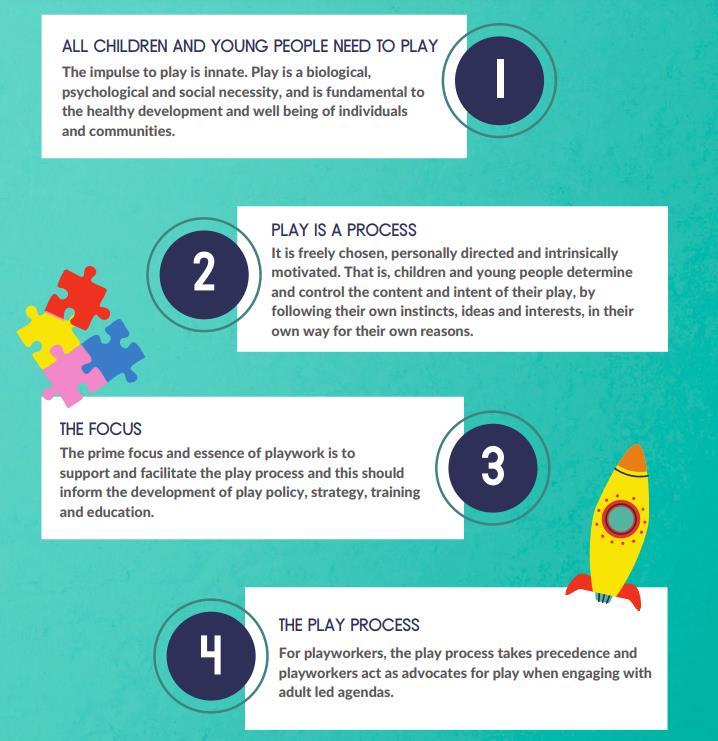Castle Primary School refers to this play policy in all decisions affecting children’s play. Our school is committed to providing the strategic and operational leadership needed to provide and maintain quality play provision for all our children.
At Castle Primary School we believe that all children need opportunities to play that allow them to explore, manipulate, experience and affect their environment. We believe play provision should be welcoming and accessible to every child, irrespective of gender, sexual orientation, economic or social circumstances, ethnic or cultural background or origin, or individual abilities. Children spend 20% of their time at Primary School in play and we want to ensure that this is time where learning continues.
Decades of research has shown that play reduces stress, grows our brains, helps us learn, unleashes our creativity, facilitates our relationships, and contributes to well-being. The more active and creative playtimes can be, the happier and healthier our pupils will be. Positive, happy playtimes not only work to improve the well-being of pupils, but less time spent resolving playtime incidents also results in more time engaged in classroom learning.
Play is defined as a process intrinsically motivated, directed by the child and freely chosen by the child. Play has its own value and provides its own purpose. It may or may not involve equipment or other people.
We believe play has many benefits, including:
In relation to play, our school aims to:
Castle Primary School recognises the UN Convention on the Rights of the Child, which includes the right to play, recreation and leisure (Article 31) and the right of children to be listened to on matters important to
them (Article 12). We acknowledge that we have a duty to take these rights seriously and listen to children’s views on their play.
‘Play is great for children’s wellbeing and development. When planning and providing play opportunities, the goal is not to eliminate risk, but to weigh up the risks and benefits. No child will learn about risk if they are wrapped in cotton wool.’ Managing Risk in Play Provision: An Implementation Guide (Play Safety Forum, 2012)
The school will use the Health and Safety Executive guidance document Children’s Play and Leisure – Promoting a Balanced Approach (September 2012) as the principal value statement informing its approach to managing risk in play.
In doing so, the school will adopt a risk-benefit approach as detailed in Managing Risk in Play Provision: An Implementation Guide (Play Safety Forum, 2012).
Risk-taking is an essential feature of play provision and of all environments in which children legitimately spend time at play. Play provision aims to offer children the chance to encounter acceptable risks as part of a stimulating, challenging and managed play environment. As outlined in the play sector publication ‘Best Play’, play provision should aim to ‘manage the balance between the need to offer risk and the need to keep children and young people safe from harm’.
In addition to standard risk-benefit assessments, the school will practice dynamic risk management with children, encouraging them to identify and manage risks in an environment where adults are present to support them.
The law requires that children in school have supervision but for primary school playtimes, there are no stated ratios. During the school day there should be one or more adults present outdoors. We recognise three models of supervision: Direct, Remote and Ranging. Except for new children in reception, whose skills and orientation in the school environment need to be assessed, the school does not believe direct supervision is possible or beneficial. Supervisors will use ranging and remote supervision models, so that children can quickly find an adult and adults can patrol large sites to gain an awareness of the kinds of play and levels of risk likely to be emerging.
The school is committed to assessing and monitoring the level of supervision at playtime, ensuring a safe ratio of supervision across the environment at playtimes.
The school will help children maximise the benefits they can gain from play by the provision of trained staff who are informed by and work in accordance with the Playwork Principles. Staff will use and refer to these principles when appropriate interventions are needed, and ultimately will strive to facilitate an environment that nurtures children’s self-directed play.
The playworker’s core function is to create an environment that will stimulate children’s play and maximise their opportunities for a wide range of play experiences. A skilled and experienced playworker can enrich the child’s play experience in terms of the design and resources of the physical environment and in the attitudes and culture fostered within the play setting. Playworkers are a channel of access to new materials and tools and they can act as a stimulus to children to explore and learn. They are also available to participate in the play if invited. The playworker’s role is underpinned by the 8 Playwork Principles.


Through providing a rich play offer meeting every child’s needs we will ensure all children, regardless of age, gender, race, disability or other special needs, can develop and thrive, build strong relationships and enjoy school.
We believe that a rich play setting should ensure that all children have access to stimulating environments that are free from unacceptable or unnecessary risks and thereby offer children the opportunity to explore for themselves through their freely chosen play.
We will strive to continually improve the quality and diversity of our school’s grounds to enhance play. We will use the document ‘Best Play’ to guide us on what a quality play environment should contain.
A rich play setting supports safeguarding, helps children develop confidence in team building and advocating for their own rights, increases children’s social and emotional capabilities and helps develop a love and enjoyment of the outdoors, which is a key foundation for caring for the environment.
